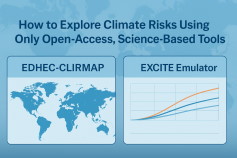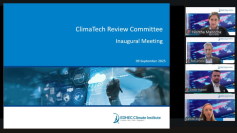Delivering new insights and tools to support informed decision-making on climate risks
The EDHEC Climate Institute (ECI) supports finance professionals and decision-makers in navigating the challenges of climate change
|
| Forward to a colleague |
|
Subscribe to our newsletter |
 |
| The EDHEC Climate Institute (ECI) supports finance professionals and decision-makers in navigating the challenges of climate change through cutting-edge research and practical tools. Our work focuses on six key areas: Physical Risks, Transition Risks, Resilience & Transition Technologies, Climate Scenarios, Green Assets, and Climate Regulation & Policies. |
|

|
|
HIGHLIGHT
Introducing A New Standard in Climate Risk Assessment
EDHEC Business School has announced the creation of Scientific Climate Ratings (SCR), the first European rating agency dedicated to assessing the financial materiality of climate-related risks. Developed through research from the EDHEC Climate Institute, SCR is the first initiative of its kind to combine climate science, geospatial data, and financial valuation models in a structured public rating framework. Initially covering more than 6,000 infrastructure assets, SCR provides forward-looking ratings designed to inform investment, regulatory, and policy decisions. In 2026, its coverage is expected to extend to 5,000 of the world’s largest listed companies.
|
|
DATAVIZ
EDHEC Climate Institute Unveils Open-Access Tools to Explore Climate and Economic Risks
The institute is releasing two new open-access, interactive tools designed to make climate science more accessible while preserving full scientific rigour. These tools help researchers, policymakers, investors, and the wider public explore how climate change and emissions pathways may shape future environmental and economic outcomes.
 EXCITE Emulator EXCITE Emulator enables users to simulate possible global surface temperature outcomes under a wide range of greenhouse gas emissions. scenarios, including IPCC AR6 and NGFS scenarios  EDHEC CLIRMAP EDHEC CLIRMAP projects the regional economic impacts of mean temperature changes (i.e., the chronic component of physical climate risks) on Gross Regional Product (GRP) per capita.
|
|

|

|
|
INSIGHT
Recalibrating Climate Risks: How to Assign Probabilities to Climate Scenarios
Climate scenarios have become a cornerstone in helping financial decision-makers navigate the uncertainties of climate risks. But even with cutting-edge models from Oxford Economics and the NGFS, investors still lack a clear picture of their true exposure. Here’s the critical gap: these scenarios don’t tell us how likely different outcomes are. That’s a problem this study aims to solve. The deliberate avoidance of assigning probabilities makes asset valuation and regulatory decisions less effective. It leads to poor risk management and weaker climate strategies.
|
|
POLICY NOTE
The Carbon Footprint of Final Demand: Evolving Methods and Insights from Environmentally Extended Input-Output Analysis
This new policy note reviews how Environmentally Extended Input-Output (EEIO) analysis has transformed our understanding of carbon footprints. It shows how EEIO traces emissions across supply chains and allocates them to final demand. The note synthesises insights from studies of household consumption, investment, and government spending as key drivers of final demand, and highlights emissions mitigation levers in developed and developing countries, and across income groups. It also discusses methods to reallocate capital investment emissions to consumption, showing how they affect country-level footprints and generate new sectoral insights to inform fairer and more effective climate strategies.
|
|

|

|
|
NEWS
First Meeting of the ClimaTech Peer Review Committee
On 9 September 2025, the EDHEC Climate Institute convened the inaugural meeting of the ClimaTech Peer Review Committee, marking an important milestone in the rollout of the ClimaTech research programme. The Committee brings together experts from academia, finance, policy, and industry to ensure that the programme’s findings are robust, practical, and internationally relevant. Its work will support policymakers, investors, and asset managers in addressing the urgent challenges of decarbonising infrastructure and strengthening resilience against climate-related risks.
Call for ParticipationECI welcomes additional experts and practitioners to join its ClimaTech Peer Review Committee. If you would like to share your expertise and take part in shaping this ambitious programme, please contact rob.arnold@climateimpactedhec.com.
|
|

|
|
About EDHEC Climate Institute:
Reflecting EDHEC Business School's strategic commitment to sustainability and climate finance, the EDHEC-Risk Climate Impact Institute has evolved into the EDHEC Climate Institute (ECI), consolidating the School's expertise in climate-related financial research and decision-making. ECI's mission is to help private and public decision-makers manage climate-related financial risks and make the most of financial tools to support the transition to a low-emission economy that is more resilient to climate change. It has a long track record as an independent and critical reference centre in helping long-term investors to understand and manage the financial implications of climate change on asset prices and the management of investments and climate action policies. The institute has also developed an expertise in physical risks, developing proprietary research frameworks and innovative approaches. ECI is also conducting advanced research on climate transition risks, with a focus on supply chain emissions (Scope 3), consumer choices, and emerging technologies. As part of its mission, ECI collaborates with academic partners, businesses, and financial players to establish targeted research partnerships. This includes making research outputs, publications, and data available in open source to maximise impact and accessibility.
Subscription Options:
You have received this e-mail as a financial professional listed in our database, or because you have agreed to receive communications from us. Please consult our Privacy Notice for more information.
• If you do not wish to receive further updates on this specific publication, please decline here.
• If you no longer wish to receive any information from EDHEC Climate Institute, you may unsubscribe here.
• If you wish to update your contact details, please inform us here.
|
|






